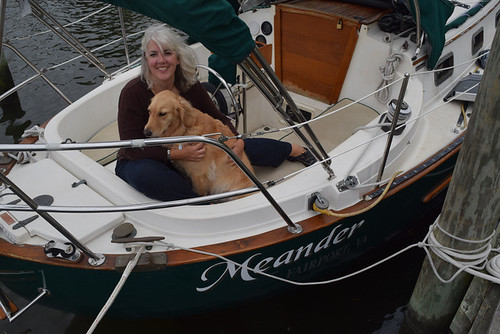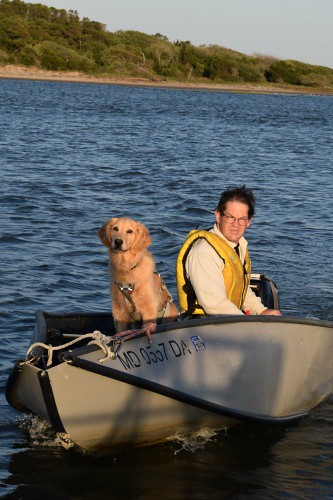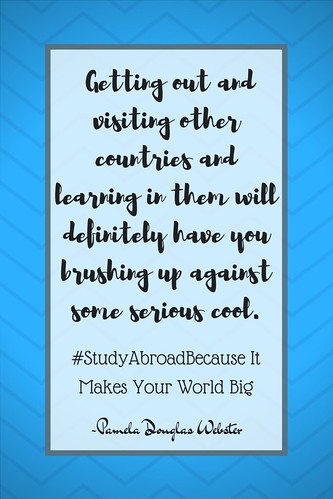Pamela Douglas Webster studied European history while traveling in nine different countries at the end of her college career. After working in private historical societies and nonprofits, she learned how to sail. She now lives on board a 34 foot sailboat with her husband and dog and cruises the Chesapeake Bay and eastern United States. She works and plays at pet-friendly travel and blogs about life on board with her dog at http://www.somethingwagging.com.

Pamela and Honey in the cockpit of Meander at the dock
What motivated your decision to go abroad? How/why did you choose where to go?
I was studying history in college with a concentration in "everything but American" (lots of European history with some classes in African and Japanese history). It seemed crazy to study history without actually visiting the places I was learning about. So when I saw that Gordon College offered a summer travel tour throughout Europe studying Reformation and Renaissance history, it seemed like a perfect fit.
In addition, I entered college with Advanced Placement credits and took required classes at the local community college when I went home to work over the summer. I was only six credits shy of graduating at the end of my junior year so the credits from this travel experience allowed me to graduate early and save quite a bit of money over the standard tuition, room, and board at my private college.
And by starting work early, I got a good start on paying off student loans so that I didn't have any debt when I got married a few years later.
What was your experience like? What is your favorite memory? What were some challenges you observed?
This was my first trip overseas. It was organized enough that I didn't have to be incredibly adventurous (the organizers planned our route and places to stay) while allowing me my first chance to make independent choices in a setting that was new to me.
I learned that my favorite way to travel was to experience life similar to the people who lived in the place I was visiting. I didn't avoid EVERY historical site. But I often spent time sketching or people watching in local parks instead of hitting every tourist destination.
One funny memory was when someone came up to me when I was sketching in a park in Bruges, Belgium struggling to ask me a question in French. I looked up and replied to him in English. I'll never forget how angry and frustrated he looked because I "fooled" him into thinking I was a local.
Bruges was also the site of my favorite museum, the Groeninge. It was an exquisite museum of Flemish art from the middle ages to modern times with a beautiful courtyard that placed the visitor in a perfect frame of mind for viewing the art.
To this day, I don't think I've enjoyed any museum or gallery more.
Most of my challenges revolved around getting along with my fellow travelers. We camped much of the time and staying in a leaking tent in Normandy when you have to rise at 5 a.m. to catch the ferry to cross the channel will stress even the most affable roommate.
Traveling with regular companions who were strangers to me was the first time I learned how annoying I can be to people when I try too hard to anticipate what they want and work too hard to get along with them. I am much more successful when I stand up for myself more than when I try to mold myself into other people's expectations of me.
It is a lesson I continue to fail to put into practice 32 years later. But I will keep trying to learn it.
What skills did you develop from your experience? Do you feel changed from your experience abroad?
It was helpful to learn at a fairly young age how different cultures are--that France or Germany are not just like the U.S. but with different languages. It increased my acceptance of different ways of viewing the world that benefits me to this day.
While members of my family and friends struggle to retain relations with fellow Americans with whom they disagree politically, I find it easier to understand why people have differing opinions. And while I don't support words or actions I find hurtful, I don't feel personal animosity toward people I disagree with.
I am pleased that I can talk about political and social controversies without anger and hope that I can encourage others to feel empathy toward people different them themselves.
It's also great when I meet European sailors to be able to share places I've been that are familiar to them. A couple of Swiss sailors I know enjoyed hearing me tell them how much I loved Lauterbrunnen. And I had a lovely chat with some German RV travelers on the beach in Florida who were thrilled to meet an American willing to speak (my poor) German with them.

Mike bringing Honey back to Meander after taking her for a "walk" on the beach on Price Creek north of Charleston, South Carolina.
Has your experience helped you get to where you are today?
Studying abroad was the first hint that I had a case of wanderlust. Now that I live full time cruising on a sailboat, I see it as the first time I discovered my love of novelty.
Since I didn't grow up sailing, I don't think I would have had the courage to take it up in my 40s and decide to live on a boat without having a good experience traveling in college.
I was a bargain traveler in Europe. And now I am a bargain sailor.
I live a simple life on my boat and get to meet new people, spend time in nature, and visit new places--it's the marine version of sitting in a park sketching and chatting with locals.
What advice would you share with other students who are thinking of going abroad?
Having money insulates Americans from many wonderful experiences. Choosing an educational experience abroad that doesn't involve expensive accommodations or travel methods will give you more chances to meet different kinds of people. And there are wonderful ways to enjoy yourself for free in many places.
If you can learn how to be happy with small amounts of money, you will open up many exciting possibilities for yourself that just aren't available to people who can't bring themselves to use an outdoor toilet or eat anything but the food they grew up with.
And do the math. You may find that study abroad is even less expensive than studying at home.
How has international education impacted or influenced your cultural identity?
I definitely understand just how much of an American I am. Although I love foreign films and eat any kind of food and follow news in countries throughout the world, I am very American. It's hard to live in a place your entire life and not have it affect your mindset.
And except for that angry tourist in Bruges, no one would ever mistake me for anything but an American by looking at me.
But I'm very interested in current events in other countries. I am as interested in the election news from Venezuela or Zimbabwe as I am with what's happening in the United States. And I can only think that is a result of both my history degree and international travel as a young person.
Is there anything else you'd like to share with us?
Occasionally I meet families cruising with children and teenagers. They have traveled all over the world. And these are the coolest kids you ever want to meet.
You may not be able to buy a boat and sail around the world. But getting out and visiting other countries and learning in them will definitely have you brushing up against some serious cool.

Honey snoozing at anchor in Reedville, Virginia
#StudyAbroadBecause It Makes Your World Big
Pin for later:

All photos courtesy and copyright Pamela Douglas Webster
